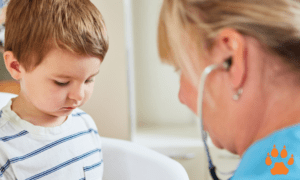By: Dr. Veja Tillman, DVM
What is Giardia?
Giardia is currently one of the most common causes of diarrhea in our area. At Just 4 Pets Wellness Center, we diagnose it multiple times a week. It is rapidly becoming common in our area.
Giardia is not a typical “worm” parasite. It is a microscopic, protozoal parasite. It lives and grows in the bowels of humans and pets. When the numbers get high enough, it typically sends waves of cysts (their version of eggs) outside of the body, usually in the form of loose stool or diarrhea.
How do people and pets get it?
Animal and people who come into contact with contaminated stool become infected when they ingest the cysts. Giardia is not transmitted through blood or urine.
Exposures occur when giardia cysts are picked up from surfaces and objects that contain traces of stool from an infected animal. Once exposed, the giardia cysts are ingested and the infection develops inside of the intestinal tract.
Other sources of potential exposure include: dog parks /beaches, day-care and boarding facilities; drinking water sources where Giardia may live (rivers, lakes, streams or wells), traveling to countries where giardia is common, keeping your pet in a wet environment, not picking infected stools up completely and daily or not cleaning litterboxes daily and disinfecting them regularly.
How do we know a pet has Giardia?
Symptoms may vary from nothing at all to The most common symptom of Giardia is soft stool and diarrhea. This symptom can come and go. It can be accompanied by gas, abdominal cramps, upset stomach, nausea and vomiting. Dehydration and unexplained weight loss are also common. In puppies and kittens, severe giardiasis might slow development and cause malnutrition and stunting of growth.
How is Giardia treated?
Giardia can be treated with prescription medications, which typically is administered for 10 days or more. Sometimes this treatment must be repeated in stubborn cases of giardia. Young pets may harbor the organism and keep reinfecting themselves for up to a year.
How can I prevent this parasite?
Giardia thrives in wet environments. It does not survive for long periods of time in dry environments. So, keeping your pet’s environment clean and dry will help to eliminate giardia cysts from surviving and reinfecting you and your pets.
Environmental disinfection and good personal hygiene are important to prevent the accidental spread of giardiasis. For best results, thoroughly clean your pet’s living and sleeping areas and then allow the areas to dry out for several days before reintroducing pets. It is also a good idea to wipe a pet’s rectal area with a baby wipe after each and every bm, to prevent traces of stool from contaminating rugs, floors, bedding and furniture.
Hygiene involves washing hands carefully after handling pets in any way, their food bowels and after picking up yard waste. Picking up all stools promptly, daily doggie or kitty butt-wiping and refraining from allowing pet kisses will help decrease contamination and exposure to this parasite. Questions? You can contact Just 4 Pets Wellness Center by calling (239) 270-5721. More information is also available through the Center for Disease Control and Prevention which takes Giardia very seriously as a public health threat: https://www.cdc.gov/parasites/giardia/index.








